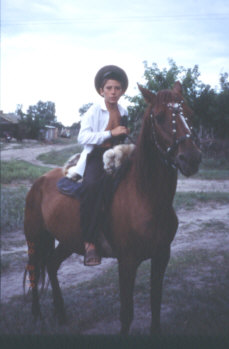|

PEOPLE
During the 17th century, every
male who belonged to a military unit and owned weapons was considered
a Cossack. The Cossack's prestige depended on how long he (or his ancestors)
lived on the Don. Those who were not Cossacks had to subordinate themselves
and depended on the Cossacks. Until today, each inhabitant of the area
knows if he is a Cossack or if he belongs to the social class of the farmers.
This seperation certainly had a great influence on the events on the Don
during the civil war and the time of collectivization on the Don. Naturally,
men always played the decisive role among the Cossacks, although the independance
of Cossack women came to the forefront again and again. After all, the
women often had to take care of and defend their households alone during
Cossack campaigns.
|

Cossack boy on horseback
|
Still, a boy received much more attention than a girl from
birth onward. A number of special customs accompanied his maturing to manhood.
One of these concerned the first tooth: when a little boy's first tooth broke
through, relatives and friends were invited to a feast. The boy received a multitude
of presents which would be useful to him in his later life as a Cossack. Such
presents included saddles or fishing-rods.
When the boy turned three years old, his father adorned
him with a saber, sat him on a horse and led the horse in a circle. Then, he
cut the boy's hair to an equal lenght and gave him to his mother, speaking the
words, "I congratulate you, woman; you have a Cossack!". Afterwards,
the boy was led to church on horsenack. There, the community prayed for him
to grow into a brave Cossack. Within this custom, the circle appeared several
times, symbolizing equality to the Cossacks.
In adolescence, the Cossack community took over the education
of the boy, who now served as a helper and weapon-carrier with the more experienced,
"better", or older Cossacks. In the Cossack gathering (the circle),
he had no right to vote until he had been named a member himself. The relationship
between "old" and "young" Cossacks was fatherly.
Marion Krause
20.1.2000

